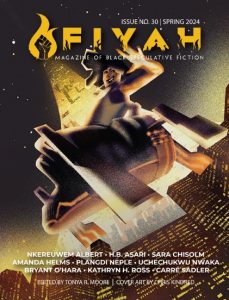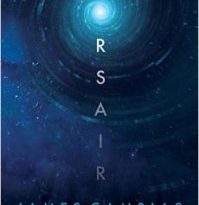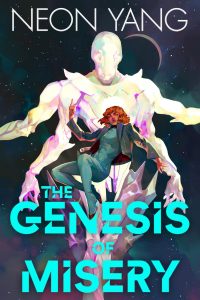Charles Payseur Reviews Short Fiction: GigaNotoSaurus, Fiyah, and Baffling
 GigaNotoSaurus 3/24
GigaNotoSaurus 3/24
Fiyah Spring ’24
Baffling 4/24
GigaNotoSaurus’s April story, “The Grandmother Hypothesis” by J.S. Richardson, finds the narrator jumping from reality to reality using a machine of her own creation – one that cannot take her home again. But returning to her own world was never the goal, not after losing her child, and the story follows the narrator as she loses herself trying to explore, and torture herself with, the what-ifs of the universe. When a particular encounter sends her reeling, though, an ill-advised jump lands her very far from her home reality, and she passes through a series of increasingly dystopian worlds where she is in danger of much more than grief and yearning. Richardson crafts an aching and contemplative journey of a woman who makes a series of poorly thought-out decisions, across dimensions and possibilities, and finally finding the future she thought was shattered still exists in front of her, if she’s willing to live it. It’s a great read.
The latest issue of Fiyah is unthemed and full of wonderful fiction and poetry, including “Not All Your Bones Are Yours” by Plangdi Neple, a rather grim take on mermaid stories that finds Sami deep in grief following the death of his lover, Tochi. For all his sorrow, though, it’s his guilt and determination that make him both desperate and tragic in his attempts to be reunited with his lost love, who was a merman who had received legs in order to live on dry land with Sami. It’s a fascinating and rending journey for Sami, whose mistakes just keep on compounding, bringing out of his love for Tochi violation after violation until even he cannot avoid or deny the damage he’s authored. Neple shows great skill in hitting readers directly and repeatedly in the feels, and though it’s not for the faint of heart, it’s still well worth checking out. Uchechukwu Nwaka’s “No Happy Endings for Chasers” continues the focus on grim situations made worse by people feeling trapped in decisions that draw them into violence and danger. Buchi never wanted to be a Chaser, after all – one who goes out beyond the walls to face the alien chikiriki who arrived during an event called the Falling that has pushed humanity into fortress-like settlements. But the constant pressure both to earn money and prove his masculinity to a father who does not accept his queerness sets him on a path on which killing and being killed are the only options available. When it turns out he’s good, he risks forgetting both himself and the risks as he is drawn into bigger and bigger raids against the chikiriki. As the title suggests, the promise of acceptance, success, and fortune can often obscure the most common outcome for those who live by killing. Nwaka captures the wrenching place Buchi is trapped in, and the delicate hope that comes stained with alien blood. H.B. Asari’s poem “Vampire Myths and Facts” shows further thematic throughlines in the issue, looking at both the cursed nature and supposed glamor of vampires. The piece explores how people can make the choice to be turned, especially when – like the female narrator, convinced of her own body’s worthlessness – they yearn for more power and meaning. Asari explores through the concept of vampirism the ways that society pressures people to reject their own bodies, embracing a toxic aesthetic that promises power and freedom but delivers instead a curse of isolation, loss, and dissociation. It’s a fascinating read.
April’s Baffling features queer speculative fiction that ranges from apocalyptic visions to the more grounded contemporary fantasy of Catherine Yu’s “Sunshine City”, in which two girls share a magical place they can visit, full of wonder and acceptance. Until, at least, one of the girls walks away, leaving the narrator reeling from the rejection and loss – the grief at having such an important part of her world twined with sorrow and anger. Yu follows that narrator into adulthood, where Sunshine City remains a powerful memory, a nostalgic force that she can’t fully share even with the woman she decides to spend her life with. And yet, as the narrator confronts the magic of her past with the woman she loves, it creates something new, and I appreciated how the story balances the vulnerability of youth with the possibility of magic and healing and growth that does not diminish with age. It’s lovely. And from contemporary fantasy to science fiction with the strange time travel story of Sam J. Miller’s “Notes on Genocidal Interchronological Incursion 57.7.3 (f.k.a. ‘Friends’)”. The piece looks at forgery in the form of incursions from the future into what is now the past, and the ways in which it’s very difficult to really identify and resist cons without the right tools and experiences. The story describes a kind of cycle of exploitation and deception where, even as people learn how to see through the lies and plots preying on them, powerful people are already rolling out new ones. The piece looks at the television show Friends as a plot by future powers to try and change New York to fit their vision of what they’d like it to be, changing not only the public imagination but reality itself. Miller laments in some ways that there is no real victory over these kinds of plots, just the continuous work of trying to stay ahead of them, reaching for a better future but always needing to adjust to the complex and subtle ways that work can be suppressed, subverted, and co-opted by those trying to codify their own prejudices and hatreds as the status quo. It’s a complex read, but well worth digging into.
Recommended Stories
“Not All Your Bones Are Yours”, Plangdi Neple (Fiyah 4/24)
“No Happy Endings for Chasers”, Uchechukwu Nwaka (Fiyah 4/24)
“Notes on Genocidal Interchronological Incursion 57.7.3 (f.k.a. ‘Friends’)”, Sam J. Miller (Baffling 4/24)
Charles Payseur is an avid reader, writer, and reviewer of speculative fiction. His works have appeared in The Best American Science Fiction and Fantasy, Lightspeed Magazine, and Beneath Ceaseless Skies, among others, and many are included in his debut collection, The Burning Day and Other Strange Stories (Lethe Press 2021). He is the series editor of We’re Here: The Best Queer Speculative Fiction (Neon Hemlock Press) and a multiple-time Hugo and Ignyte Award finalist for his work at Quick Sip Reviews. When not drunkenly discussing Goosebumps, X-Men comic books, and his cats on his Patreon (/quicksipreviews) and Twitter (@ClowderofTwo), he can probably found raising a beer with his husband, Matt, in their home in Eau Claire, Wisconsin.
This review and more like it in the June 2024 issue of Locus.
 While you are here, please take a moment to support Locus with a one-time or recurring donation. We rely on reader donations to keep the magazine and site going, and would like to keep the site paywall free, but WE NEED YOUR FINANCIAL SUPPORT to continue quality coverage of the science fiction and fantasy field.
While you are here, please take a moment to support Locus with a one-time or recurring donation. We rely on reader donations to keep the magazine and site going, and would like to keep the site paywall free, but WE NEED YOUR FINANCIAL SUPPORT to continue quality coverage of the science fiction and fantasy field.
©Locus Magazine. Copyrighted material may not be republished without permission of LSFF.






